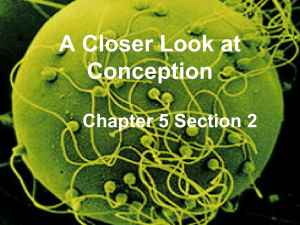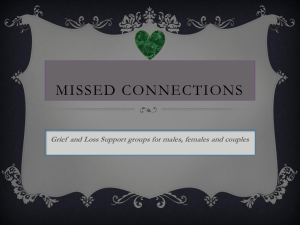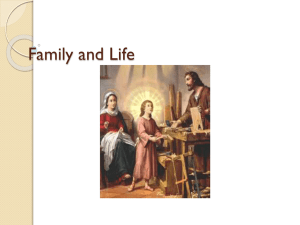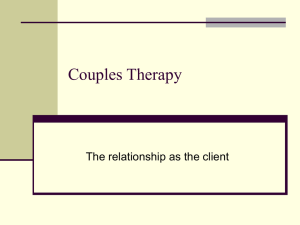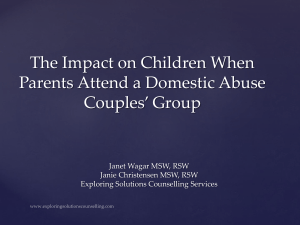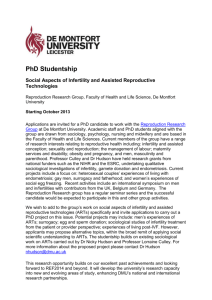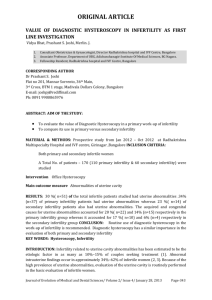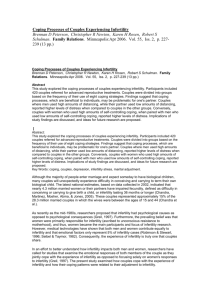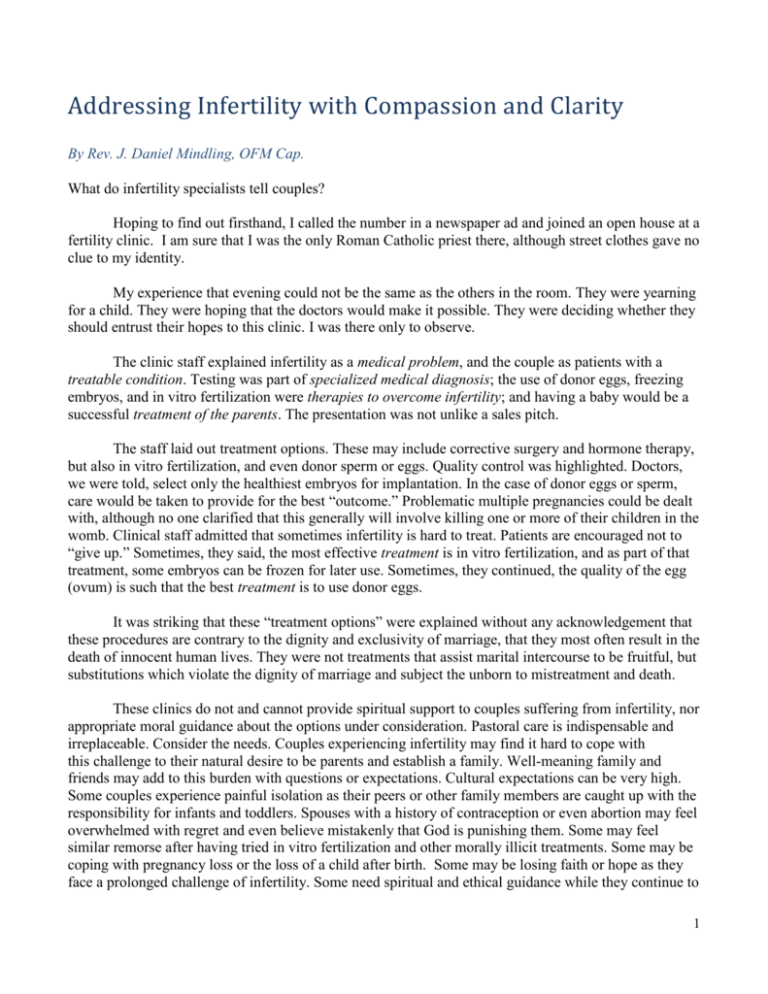
Addressing Infertility with Compassion and Clarity
By Rev. J. Daniel Mindling, OFM Cap.
What do infertility specialists tell couples?
Hoping to find out firsthand, I called the number in a newspaper ad and joined an open house at a
fertility clinic. I am sure that I was the only Roman Catholic priest there, although street clothes gave no
clue to my identity.
My experience that evening could not be the same as the others in the room. They were yearning
for a child. They were hoping that the doctors would make it possible. They were deciding whether they
should entrust their hopes to this clinic. I was there only to observe.
The clinic staff explained infertility as a medical problem, and the couple as patients with a
treatable condition. Testing was part of specialized medical diagnosis; the use of donor eggs, freezing
embryos, and in vitro fertilization were therapies to overcome infertility; and having a baby would be a
successful treatment of the parents. The presentation was not unlike a sales pitch.
The staff laid out treatment options. These may include corrective surgery and hormone therapy,
but also in vitro fertilization, and even donor sperm or eggs. Quality control was highlighted. Doctors,
we were told, select only the healthiest embryos for implantation. In the case of donor eggs or sperm,
care would be taken to provide for the best “outcome.” Problematic multiple pregnancies could be dealt
with, although no one clarified that this generally will involve killing one or more of their children in the
womb. Clinical staff admitted that sometimes infertility is hard to treat. Patients are encouraged not to
“give up.” Sometimes, they said, the most effective treatment is in vitro fertilization, and as part of that
treatment, some embryos can be frozen for later use. Sometimes, they continued, the quality of the egg
(ovum) is such that the best treatment is to use donor eggs.
It was striking that these “treatment options” were explained without any acknowledgement that
these procedures are contrary to the dignity and exclusivity of marriage, that they most often result in the
death of innocent human lives. They were not treatments that assist marital intercourse to be fruitful, but
substitutions which violate the dignity of marriage and subject the unborn to mistreatment and death.
These clinics do not and cannot provide spiritual support to couples suffering from infertility, nor
appropriate moral guidance about the options under consideration. Pastoral care is indispensable and
irreplaceable. Consider the needs. Couples experiencing infertility may find it hard to cope with
this challenge to their natural desire to be parents and establish a family. Well-meaning family and
friends may add to this burden with questions or expectations. Cultural expectations can be very high.
Some couples experience painful isolation as their peers or other family members are caught up with the
responsibility for infants and toddlers. Spouses with a history of contraception or even abortion may feel
overwhelmed with regret and even believe mistakenly that God is punishing them. Some may feel
similar remorse after having tried in vitro fertilization and other morally illicit treatments. Some may be
coping with pregnancy loss or the loss of a child after birth. Some may be losing faith or hope as they
face a prolonged challenge of infertility. Some need spiritual and ethical guidance while they continue to
1
hope for a child, others may need help as they carry the cross of incurable infertility. Some need the
ministry of Church organizations as they consider adoption or other ways of nurturing and caring for
children. The need for compassionate pastoral care and support is great.
Working with infertile couples is a pro-life and pro-marriage ministry. As the Vatican Instruction
Donum Vitae explained, marriage promotes respect for the dignity of the child and vice versa: “The
fidelity of the spouses in the unity of marriage involves reciprocal respect of their right to become a
father and a mother only through each other. The child has the right to be conceived, carried in the
womb, brought into the world and brought up within marriage: it is through the secure and recognized
relationship to his own parents that the child can discover his own identity and achieve his own proper
human development” (DV, part II). The Church supports morally sound treatment to help married
couples have children, rejoicing that “many researchers are engaged in the fight against sterility. While
fully safeguarding the dignity of human procreation some have achieved results which previously
seemed unattainable” (DV, 8).
Simply presenting couples seeking a child with a list of prohibited procedures is far from a
holistic and supportive pastoral approach. Pastoral care is more than the moral evaluation of treatment
alternatives. At the clinic, infertile couples will hear a scientist or doctor offering them hope for a child,
and at church they must receive much more than a priest telling them no. In Dignitas Personae the
Church reminds us that “behind every ‘no’ in the difficult task of discerning between good and evil,
there shines a great ‘yes’ to the recognition of the dignity and inalienable value of every single and
unique human being called into existence” (37). That “yes” must be apparent in our message to infertile
couples.
“You send them away with theology, but the clinic sends them home with a baby,” one person
told me recently. Aside from the fact that clinics send many couples home without a baby, this protest
misses a great deal of the role of the Church. She should stand with the infertile couple in solidarity, and
stand up for basic human rights whenever challenged by a culture that seeks to overcome infertility at
any cost, viewing children as a product or a right. There are indeed methods for treating the infertile
couple with full respect for the dignity of the spouses and for the life to be born. A pastoral approach to
the infertile couple supports their faith, their dignity, their marriage, and their vocation. It recognizes the
fruitfulness that all marriages are called to share, including marriages without the blessing of children. It
offers compassion and clarity. When needed, it offers reconciliation and healing.
My visit to the clinic convinced me more than ever of the need for the Church to respond to the
challenges of couples who struggle with infertility. Let us offer the light of the Gospel and the warmth
of the heart of the Church to all couples who yearn for a child.
Rev. J. Daniel Mindling, OFM Cap. is Academic Dean at Mount St. Mary’s Seminary, Emmitsburg,
Maryland, and is a consultant to the USCCB Committee on Pro-Life Activities.
Copyright © 2009, United States Conference of Catholic Bishops, Washington, D.C. All rights reserved.
2

